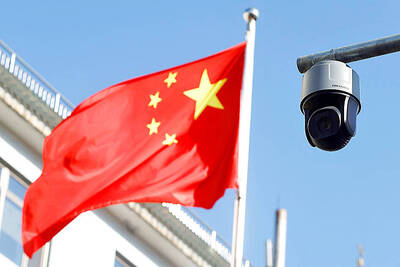China’s muted response to the weekend victory by president-elect William Lai (賴清德) signals what some analysts see as the start of an uneasy four months before he takes office, with Beijing treading carefully before then.
Lai, from the Democratic Progressive Party (DPP), will not replace President Tsai Ing-wen (蔡英文) until May 20, but Beijing has little appetite to break a delicate balance that has settled over its ties with Washington in the past few months, some diplomats and analysts say.
The situation is further complicated by a looming US presidential election in November, risking plenty of bipartisan pressure from candidates as foreign policy debates intensify.

Photo: EPA-EFE
The tiny Pacific island nation of Nauru on Monday announced it had ended its recognition of Taiwan for China, which reflects a long-running diplomatic effort by Beijing to deprive Taipei of its diplomatic allies.
Taipei described the move as an act of post-election malice.
However, while Beijing might maintain pressure on Taipei to enforce what it calls “red lines” over independence, it is unlikely to tighten the squeeze just yet.
“The line is very clearly drawn,” said Victor Gao (高志凱), a professor at China’s Soochow University. “China will not fire the first shot, but China will never allow pro-Taiwan independence activists to fire the second shot, after firing a first shot which is anti-peace.”
“China’s response is relatively muted now because it wants to leave it to the US to rein in Lai first,” said Qi Dongtao (祁冬濤), a senior research fellow at the East Asian Institute in Singapore. “If the US fails to rein Lai in, then China can step in.”
Taipei-based political scientist Sung Wen-ti (宋文笛), a non-resident fellow at Washington’s Atlantic Council think tank, said that Beijing’s courting of Nauru was “low-hanging fruit.”
Chinese officials are now likely conducting internal studies into what went wrong — why Beijing’s preferred Chinese Nationalist Party (KMT) did not take the presidency, Sung said.
Not that it was a complete failure. Lai won less than 40 percent of the vote and together with the Taiwan People’s Party, the KMT could form a majority in the legislature.
After his victory on Saturday, Lai said he wanted to improve ties with China and was open to talks, but Beijing has no shortage of options should his rhetoric change or broader Washington-Beijing ties cool again.
Western diplomats say that China’s Central Military Commission, commanded by Chinese President Xi Jinping (習近平), has likely been presented with a variety of escalatory options beyond its on-going deployments across and around Taiwan.
China’s military has not directly commented on the election, but on Monday its Eastern Theater Command released footage of naval combat drills in the East China Sea, without giving a detailed location.
Such action is on a vastly smaller scale to the extensive missile drills and naval maneuvers that surrounded Taiwan after the visit to Taipei by then-US House of Representatives speaker Nancy Pelosi in August 2022.
Economically, Beijing has coercive options too given on-going business flows and trade ties, while security analysts and diplomats say China has the ability to attempt cyberattacks against Taiwan infrastructure.
Late last month, China scrapped tariff cuts on 12 types chemical products it imported from Taiwan — a move described by Taipei officials as an attempt to interfere in the election.
However, further pressure on the two sides’ 2010 Economic Cooperation Framework Agreement cannot be ruled out, analysts said.
“The economic sanctions option they tried three weeks or so before and didn’t work. So now Beijing needs to retool and optimize how it’s going to use economic sanctions in a way that can send its message against Lai without unduly alienating Taiwanese society,” Sung said.
Politically, too, Beijing can exploit connections with opposition figures and groups, analysts said, adding that China’s Taiwan Affairs Office on Saturday said that the vote tally showed the DPP “cannot represent mainstream public opinion.”
So far, China’s state media have kept a low profile, with no editorials on the election result published by the English-language Global Times or a CCTV-affiliated social media blog that frequently comments on Taiwan issues.

POLAM KOPITIAM CASE: Of the two people still in hospital, one has undergone a liver transplant and is improving, while the other is being evaluated for a liver transplant A fourth person has died from bongkrek acid poisoning linked to the Polam Kopitiam (寶林茶室) restaurant in Taipei’s Far Eastern Sogo Xinyi A13 Department Store, the Ministry of Health and Welfare said yesterday, as two other people remain seriously ill in hospital. The first death was reported on March 24. The man had been 39 years old and had eaten at the restaurant on March 22. As more cases of suspected food poisoning involving people who had eaten at the restaurant were reported by hospitals on March 26, the ministry and the Taipei Department of Health launched an investigation. The Food and

The long-awaited Taichung aquarium is expected to open next year after more than a decade of development. The building in Cingshui District (清水) is to feature a large ocean aquarium on the first floor, coral display area on the second floor, a jellyfish tank and Dajia River (大甲溪) basin display on the third, a river estuary display and restaurant on the fourth, and a cafe and garden on the fifth. As it is near Wuci Fishing Port (梧棲漁港), many are expecting the opening of the aquarium to bring more tourism to the harbor. Speaking at the city council on Monday, Taichung City Councilor

A fourth person has died in a food poisoning outbreak linked to the Xinyi (信義) branch of Malaysian restaurant chain Polam Kopitiam (寶林茶室) in Taipei, Deputy Minister of Health and Welfare Victor Wang (王必勝) said on Monday. It was the second fatality in three days, after another was announced on Saturday. The 40-year-old woman experienced multiple organ failure in the early hours on Monday, and the family decided not to undergo emergency resuscitation, Wang said. She initially showed signs of improvement after seeking medical treatment for nausea, vomiting and diarrhea, but her condition worsened due to an infection, he said. Two others who

Taiwanese should be mindful when visiting China, as Beijing in July is likely to tighten the implementation of policies on national security following the introduction of two regulations, a researcher said on Saturday. China on Friday unveiled the regulations governing the law enforcement and judicial activities of national security agencies. They would help crack down on “illegal” and “criminal” activities that Beijing considers to be endangering national security, according to reports by China’s state media. The definition of what constitutes a national security threat in China is vague, Taiwan Thinktank researcher Wu Se-chih (吳瑟致) said. The two procedural regulations are to provide Chinese